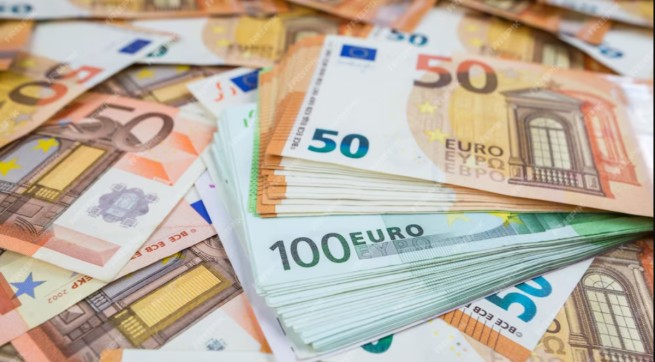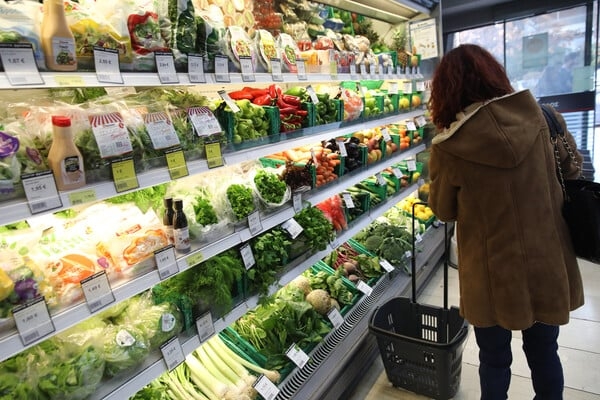The problem of increasing food prices is getting worse. Inflation in our country stabilized at 7% in January last year, while rising food prices proceeds at a steady pace.
This year, the cost of food and household chemicals will grow even more, “they will completely devastate the family budget.” According to the management of the companies producing the respective products, consumers around the world will pay even more this year than in 2022unless the cost of raw materials falls or there is a switch to cheaper products, which may curb inflation somewhat.
According to Greek National Bureau of Statistics ΕΛΣΤΑΤ, the food price index “stopped” at 15.4%. The largest growth in the food sector was recorded last month:
- for dairy products and eggs – 25%,
- fats and oils – 23.1%,
- meat – 19%,
- bread and cereals – 18.6%,
- coffee, cocoa and tea – 10.9%.
The largest increase in prices in January was recorded for air tickets – 52.4%. As “Afinskie novosti” wrote earlier, the rise in prices is an international problem.
This year, the cost of food and household chemicals will grow even more, “they will completely devastate the family budget.” According to the management of the companies producing the respective products, consumers around the world will pay even more this year than in 2022unless the cost of raw materials falls or there is a switch to cheaper products, which may curb inflation somewhat.
According to a Reuters report, Unilever management said it would continue to raise prices for detergents, soaps and packaged foods to offset rising production costs. At the same time, the situation is expected to improve somewhat in the second half of 2023.
The London-headquartered global FMCG giant, which makes products like Fairy dish detergent, Dove soap, Knorr cubes and Ben & Jerry’s ice cream, expects price increases to continue into 2023. In the last three months of 2022, prices reportedly rose by 13.3%, setting a new record as producers passed on to consumers the increased costs of goods and energy.
The packaged goods industry has raised prices over the past year to offset rising prices for everything from cocoa and sunflower oil to wheat.
Price increases will continue in the second half of the year, “but the growth rate will be lower… we are probably past the peak of inflation, but not yet at the peak of prices,” Pitkethly’s chief financial officer said.
It is noted that Unilever increased prices by 11.3% during 2022, with sales falling by 2.1%.
Some European companies have said they can “soften” the price increases passed on to consumers in recent years as increases in energy and raw materials prices eased, which could bring some relief to households. According to research firm Kantar, in the four weeks to January 22, compared to the same period last year, the British paid 16.7% more for food than before, which was a record. At the same time, U.S. food inflation rose by 10.4% in 2022.
According to a Reuters report, Unilever management said it would continue to raise prices for detergents, soaps and packaged foods to offset rising production costs. At the same time, the situation is expected to improve somewhat in the second half of 2023.
The London-headquartered global FMCG giant, which makes products like Fairy dish detergent, Dove soap, Knorr cubes and Ben & Jerry’s ice cream, expects price increases to continue into 2023. In the last three months of 2022, prices reportedly rose by 13.3%, setting a new record as producers passed on to consumers the increased costs of goods and energy.
The packaged goods industry has raised prices over the past year to offset rising prices for everything from cocoa and sunflower oil to wheat.
Price increases will continue in the second half of the year, “but the growth rate will be lower… we are probably past the peak of inflation, but not yet at the peak of prices,” Pitkethly’s chief financial officer said.
It is noted that Unilever increased prices by 11.3% during 2022, with sales falling by 2.1%.
Some European companies have said they can “soften” the price increases passed on to consumers in recent years as increases in energy and raw materials prices eased, which could bring some relief to households. According to research firm Kantar, in the four weeks to January 22, compared to the same period last year, the British paid 16.7% more for food than before, which was a record. At the same time, U.S. food inflation rose by 10.4% in 2022.







More Stories
“Bonus” of 300 euros for the long-term unemployed
Turkish tourists choose Samos for their holidays
Food: Testing for Pesticides